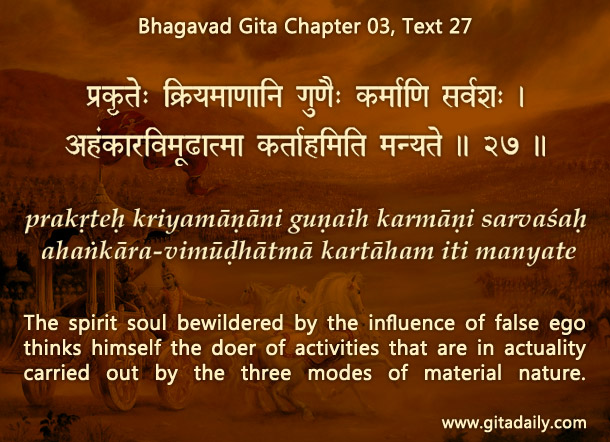The Bhagavad-gita’s teachings on doership are paradoxical. Initially, it (03.27) deems as deluded those who think themselves to be doers. Yet it (18.63) concludes by asking Arjuna to do as he desires, after deliberating its message.
How do we reconcile this contradiction?
By entering deeper into the Gita’s worldview.
It states that we are not the doers because we are not the only doers. We are small parts in a large inter-connected cosmos, wherein our actions comprise only one factor in a complex network of factors. This network that rests ultimately on divine will determines whether the result comes or not.
We are not to be the doers in the sense that we alone don’t determine the results, so we shouldn’t become proud when they come or dejected when they don’t.
Yet we are doers in the sense that we are desirers – we desire certain things and accordingly try to do them. When we desire and seek self-centered pleasure, we disrupt the order of the cosmos. Why? Because we are parts of Krishna and are meant to serve him selflessly and find supreme happiness therein. Our disruptive desires make us karmically culpable, with our culpability proportional to the disruptiveness of our intentions.
When we desire and strive to serve Krishna selflessly, we contribute to restoring order in the cosmos. The Gita (11.33) points to this divine resolution of the doer-non-doer dilemma when it asks Arjuna to simply become an instrument for Krishna. We are to do in the sense that we have to cultivate the desire to serve Krishna purely and try our best to serve him. We are not to be the doers in the sense that we alone don’t determine the results, so we shouldn’t become proud when they come or dejected when they don’t.
Thus the Gita’s paradoxical statements on doership are meant to free us from illusory self-obsession so that we can harmonize with Krishna, thereby gradually attaining the supreme fulfillment of eternal love.

Explanation of article:
https://www.youtube.com/watch?v=j9i7msr8GF4

This certainly helps to refine my thought process that i am one from many who are contributing to an activity.